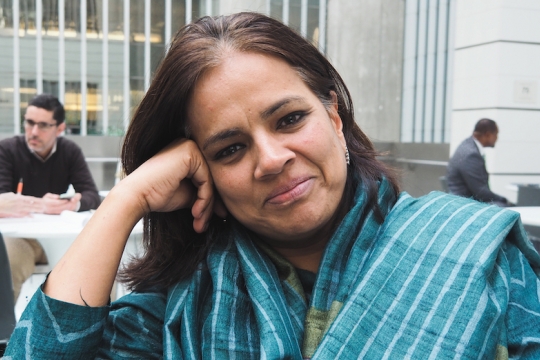Urvashi Narain is a Lead Economist at the World Bank in Washington DC. According to her, EfD and the World Bank can benefit greatly from working closer together. Meet one of four prominent keynote speakers at EfD’s Annual Meeting!
How did you get interested in environmental economy in the first place?
When I grew up in New Delhi, environmental issues were important in my family. My older sister for instance, Sunita Narain, is a leading environmentalist in India and got the Stockholm Water Prize in 2005. I too got really engrossed in those issues and realized that taking care of the environment is not a luxury, it’s about people’s livelihoods. And when I could marry that commitment to my interest in economics I was hooked.
Tell me about your work at the World Bank!
I lead strategic dialogues with our member countries. We lend money to projects and businesses that can bring about change and I identify priorities and engage in policy dialogue to define those projects.
In 2016 I wrote a book about air pollution, where I tied it to health and economic numbers, which is the language the finance ministers speak, and helped make the economic case for greater attention to air pollution management. Nature based tourism and watershed management are two other areas, where I have been involved in informing policy-makers and developing projects.
I also lead a Community of Practice for a team of 40 environmental economists at the World Bank.
Is there something that you are extra proud of?
My report on cost of air pollution really helped elevate the issue and got us involved in air pollution management in countries that previously hadn’t paid much attention to the problem. We used satellite-based data to estimate impacts, which was an innovative approach at that time, and we developed a new partnership for health assessment: with the Institute for Health Metrics and Evaluation, IHME, in Seattle.
What issues are you extra passionate about?
Nature based tourism, because the travel industry is typically one of the biggest employers in many countries. By protecting and using natural assets, we can help alleviate poverty, and support economic growth.
And air pollution of course, a hidden and silent killer that often falls between the cracks and so no line ministry pays attention to it.
What will you talk about at the Annual Meeting?
I will talk about our work on air pollution, give examples of our analytical work, explain how we choose the topics we work on, and share examples of the impact that we have achieved. Air pollution is a great example, because it’s such a complex issue, really cross-sectional, and often not seen as a prioritized area in the most severely affected countries.
What do you look forward to at the Annual Meeting?
Building partnerships between EfD and the World Bank. Both sides will benefit greatly from that. We have great access to the ministries of finance and other policymakers. We can open doors. And we can benefit from EfD’s great network of researchers.
By: Petra Hansson
Facts, the World Bank
With 189 member countries, staff from more than 170 countries, and offices in over 130 locations, the World Bank Group is a unique global partnership: five institutions working for sustainable solutions that reduce poverty and build shared prosperity in developing countries.
Source: www.worldbank.org

